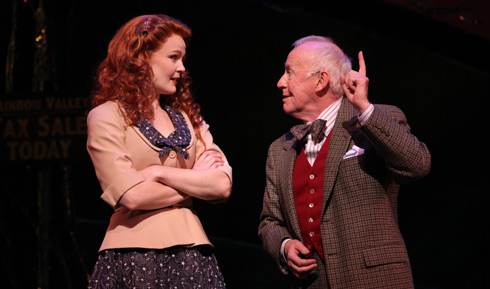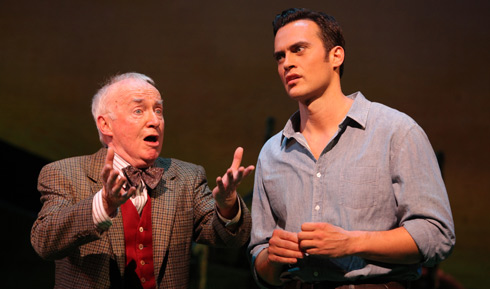Is anyone happier on Broadway than the cast of Finian's Rainbow? It's doubtful. The musical once considered as problematic as South Pacific -- despite boasting at least two standards with "Old Devil Moon" and "How Are Things In Glocca Morra?" -- appeared in Encores and then transferred to Broadway with rapturous reviews.

The New York Times said, "Permanent sunshine can confidently be predicted for the vicinity of the St. James Theater, where the joyous revival of Finian's Rainbow opened." That's the sort of review that marquees were made for, but the Times was far from alone. The Daily News said it "carries you away on a cloud of melody, magic and make-you-swoon performances." Variety confessed that "blissful surrender is the only option." TheaterMania said, "every single production element coalesces into one incandescently seamless whole."
Now the show is ensconced on Broadway, building an audience and featuring a cast that is having a blast. Star Kate Baldwin just celebrated the release of her debut CD Let's See What Happens, a tribute to the show's songwriters Burton Lane and Yip Harburg. Costar Cheyenne Jackson -- having the sort of career Rock Hudson would have had if he could sing and dance -- cements his leading man status and has his own CD out, a duets project with Michael Feinstein called The Power Of Two.
But perhaps the happiest of all is Jim Norton as Finian, kicking up his heels in a Broadway musical for the first time, still in the glow of winning the Tony for The Seafarer, and having a ball with a twinkling, thoroughly Irish role after a lifetime carefully avoiding getting typecast.
Seeing Norton in a musical is a pleasant shock for those who know him primarily for his exceptional work in dramas, especially those by Conor McPherson, which have catapulted Norton to an entirely new level of fame, beginning with The Weir in 1997. But it turns out that music was Norton's first love.
"I started as a boy soprano; that's how I got into acting," explains Norton, chatting in his dressing room at Finian's Rainbow before a recent performance. "I had quite a good voice as a kid. The first radio play came because I won this competition. They had a program on Irish radio called Children at the Microphone. So I sang my songs, I sang "Who Is Sylvia" or whatever.

"I saw these people behind the glass watching me. They asked if I acted. I said sure, school plays and the such. 'Would you want to audition for 'The Foley Family?,' which was huge. The guy who played [the teen on the show], his voice had broken. Puberty struck. That opened that door [for me] and I never thought of doing anything else after that."
Though he continued to study singing throughout his teens, from the age of ten on, Norton found a wonderful playground and the only schooling that would ever matter to him on the radio.
"I was in Brendan Behan's first play, first two plays because they were done for radio," remembers Norton. "I was the kid among this wonderful group. I met all these people and being a kid I wasn't overawed. But I was learning all the time. It was all live radio. We would do the Sunday play. I would read the short story. I would do the sports report. I would introduce the symphony orchestra. It was a wonderful training ground because in radio if you can't be seen you can play anything."
Norton's father was proud of his son, but it was his mother who really reveled in the glitter and glamour of it all -- or at least whatever glamour she could manufacture out of it.
"My father was a grocer," said Norton. "He opened one of the first delicatessens in Dublin. He wasn't at all [artistic]...he had a great voice. I've got his voice. I see myself in the mirror now and though he's a much bigger man than me, I see him. My mother was very theatrically inclined.
Did she act or does Norton mean in life?
"Oh, she was a bit of a drama queen," he smiles. "She played violin very well. She was very...artistic, I think is the word. We were sent to drama classes and elocution."
Her pride was a very public sort of pride.
"It was a bit embarrassing. She took me into a big store in Dublin around Christmas time to buy me a suit. She said to the man, 'Do you know who this boy is?' I blushed from my toes to the top of my head. I said, 'Please don't do that.' No, she was very proud. As indeed was my dad. Interestingly, he never came to see me in anything. He had the store to run and he took that very seriously. But whenever I tried to find out why, he'd say, 'Well you know something might go wrong.' I'd say, 'But, it's live theater. Things go wrong all the time.'"
Winning singing competitions, getting a role on one of the most popular radio shows in Ireland (the equivalent to TV at the time, of course), proud parents: it sounds as bright and cheerful as the world of Finian's Rainbow, where even racism can be cured with a catchy song or two. But acting was as much of a refuge as anything else for Norton.
"Acting to me is the great imaginative leap you have to make in order to become somebody else," said Norton. "And I was always happier being someone other than me. I was always happy wearing a moustache or a hat or doing a funny accent or whatever."
But didn't Norton like himself?
"Um, I don't think I really knew myself. I just felt more comfortable being other people. It's only in more recent years when you're called upon to play who you are in age that I found that I can do that. But up to that point I was always hiding, hiding behind the disguise.
Hiding from what?
"I don't know," he said. "I don't know. I was very insecure. I had a terrible education. I went to the Christian brothers and I can show you the scars."
Norton says that simply and directly, but with enough calm seriousness in his voice to let you know he's not being flippant or exaggerating in the least.
"That was really bad. And it was tough being a kid who was in the public eye being taught - for want of a better word - by that organization, which was full of very strange, bitter, vicious, sadistic people. So I had a tough time there, got beaten a lot. I guess I retreated into being other people. I retreated into being the school clown just to avoid that confrontation.
"When I finally left school, they said what are you going to do? I said, 'I'm going to be an actor. I am an actor.' They said that thing of who do you think you are? Someone from South Circle Road in Dublin and you're going to be an actor? I wasn't encouraged, shall we say. It wasn't respected."
But with his family's support -- at this point, Norton's sister was running a drama school in Dublin that was quite notable, only adding to his mother's delight -- Norton continued to work steadily in radio, TV and on the stage.
"I guess in terms of the big break, Peter O'Toole did Juno & The Paycock in Dublin in the 60s," says Norton. "I played Johnny Boyle, which is a lovely part and that really got me noticed. Then an agent from London came. I did a play called Zoo Story the next year. They said, 'We'd like to represent you.' So like most Irish actors do, I got on the boat and went to London seeking fame and fortune.
"I was very lucky that the first job I was up for was at the Royal Court. Lindsay Anderson was directing a play called The Contractor. David Story - wonderful play where they build a tent on stage every night. That ran for a year. Then I did The Changing Room after that and then I was asked to join the National Theatre. Suddenly, it was all happening. I've been fortunate although I think luck is the residue of design. You have to be ready.
When Norton mentions shows like Playboy of the Western World, I wondered if he was becoming the go-to guy for Irish roles.
"There was a danger of that so then for a while I didn't play Irish parts," says Norton. "I played Laertes to Albert Finney's Hamlet. I did Emigres with Brian Cox and I did St. Joan and I did a whole pile of things. I wanted to be an actor rather than just an Irish actor. It was only really when The Weir happened that people said, 'Gosh, he's Irish.' I'd been playing English and Germans and Americans and all kinds of strange psychopaths."
The Weir raised Norton's profile in the US dramatically, but he'd had an unusually steady career on both sides of the Atlantic. Thanks to his talented wife Mary's work that got her a contract with Disney, Norton was based in Los Angeles for a while and suddenly started working on TV shows like LA Law for people who certainly didn't know his stage work and sometimes didn't even realize he was Irish. And his turn as Bishop Brennan in the iconic Irish sitcom Father Ted made him recognizable throughout the UK and even Australia and New Zealand.
But The Weir turned Norton from an actor into a name. He also embraced his Irishness without reservation once and for all.
"When I did Laertes, [director] Peter Hall came up to me one day and said, 'You're really good in this piece. I don't want you to ever forget that you're Irish. The Irish have...there's something there. There's a madness. There's darkness. There's a thing you can call on. Whenever you need it, just remember that.'"
Norton continues to act in every McPherson play he can, but it's unlikely anything will top his now legendary performance in The Seafarer. A ghost story of sorts with a group of men playing cards with a man that might be the Devil, it featured Norton in a shattering turn as a querulous old man who literally drank himself blind. Perched on a chair, hands trembling, staring off blankly into the dark, Norton etched a portrait so funny and sad that no one but he was surprised when Norton won the Tony for Best Supporting Actor.
"It was exciting," says Norton about tackling such a demanding and wonderful role. "To me it was like an athletic event because I'm a runner and that's one of my other big passions in life. Getting on stage every night, trying to give the best performance I could, a world record performance if you like. Vocally, physically, mentally, it was a nightmare because I could never look at anybody. The way we played the blindness, I never actually looked and they never looked at me. So I was very lonely. And also I don't play poker. So I had to learn to do it by rote. All the other actors were card players. I hate cards."
Norton also famously never touched drink until he was 27 years old. (His mother was a strict tee-totaler and drink was never in their home and as far as Norton knew, his father never drank either.) Now he enjoys wine but still doesn't drink spirits. But just maintaining the physical state of a wrecked old drunk was demanding, not to mention a tumble down the stairs during a crucial scene.
"Some nights I could hardly walk home," admits Norton. "My legs hurt, my back hurt because you know coming down that stair every night, sometimes you land badly. My hip began to hurt. In the winter it was terrible. But it's what we do. It's what we love to do. It was a huge challenge to keep it going to the very end."
And when it was over, what could be next? "What part could I possible play?" said Norton. Naturally, another Conor McPherson play. He ended The Seafarer, took a week off and then dove right into the limited run of a revival of Port Authority with Brian D'Arcy James and John Gallagher Jr. of Spring Awakening. And now Finian's Rainbow. So after a lifetime of avoiding typecasting, Norton has gone from a bitter Irish drunk in one drama to the twinkling Irish rogue who loves a spot of drink, spouts blarney and tussles with a leprechaun over a pot of gold.
"It was very flattering to be asked to do a Broadway show, just to be asked without auditioning," said Norton. "I said, 'I'd love to do it but I do want to make him real. I want to make him organic. I don't want him to be a diddly idle Irish man or a Disney character.' I haven't seen the film because of that very thing. Irish people are sometimes portrayed by non-Irish actors as if they're brain damaged which I find a bit offensive.

"I want to find some substance in him to make him a real person. I think he's very devoted to her [his daughter]. He's sad in a way because his wife recently died. It's only mentioned once but that's the reason they leave Ireland. He does have unconditional love for her. And he does have the courage of his lack of convictions.
"Yip Harburg said that he wanted to rid the world of discrimination through humor. So he doesn't lay it on too heavily but he obviously had very deep political feelings at that time when he wrote it. He wanted to write something that wouldn't be a polemic but something that was going to entertain and inform and gently nudge people into an awareness."
Norton's career has followed a similar path of entertaining and gently nudging people into an awareness of his talent. Now he's doing everything from recording the works of James Joyce for audiobooks (Finnegan's Wake was a real bear, not surprisingly) to acclaimed, award-winning work on both sides of the Atlantic. Still, Norton notes that success is much more easily appreciated in the US than in England.
"My status here is totally wonderful," said Norton. "There's an enthusiasm, a response to doing good work in this country that you don't get back there. I won the Tony and I think there was one line in the British papers." [He calls back later to clarify that the Irish papers made a big deal of it, it was the London papers that mostly ignored the event.]
"I'm 71. I'm in a Broadway musical. And I feel 19."
Clearly, life is full of surprises, whether it's awards six decades into a career or new revelations about his family. After his father died, Norton met a friend of his dad, a fellow in the same line of work and mentioned how his father had never come to see him perform in a play. Not so.
"He said, 'Your dad came to see you in everything.' And he never told me. Ever. He and this friend and two other mates, they'd come and see me. And I said, 'What did you do afterwards?' He said, 'We'd go and have a drink.' I said, 'My dad didn't drink.' He said, 'Oh yes he did!'"
Norton laughs and then remembers another important person in his life.
"My grandmother, she used to say, 'It's all about what the fairies leave in the cradle,' which is a wonderful way of saying you either have it or you don't," said Norton. "She said, 'There's very little you can't do if you really want to do it and you're prepared to work hard.' I've always remembered that."
--30--
Thanks for reading. Visit Michael Giltz at his website and his daily blog. Download his podcast of celebrity interviews and his weekly music radio show at Popsurfing and enjoy the weekly pop culture podcast he co-hosts at Showbiz Sandbox. Both available for free on iTunes. Link to him on Netflix and gain access to thousands of ratings and reviews.
NOTE TO READERS: I was provided with house seats to Finian's Rainbow during previews in order to see Jim Norton's performance in the show before our interview. They were provided with the understanding that a story was in the works.
